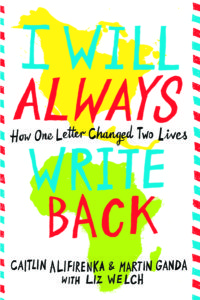I Will Always Write Back: How One Letter Changed Two Lives
Reviewed by Eileen Redden
May 1, 2016
 By Caitlin Alifirenka and Martin Ganda with Liz Welch. Little, Brown and Company, 2015. 387 pages. $18/hardcover; $9.99/paperback or eBook. Recommended for ages 12 and up.
By Caitlin Alifirenka and Martin Ganda with Liz Welch. Little, Brown and Company, 2015. 387 pages. $18/hardcover; $9.99/paperback or eBook. Recommended for ages 12 and up.
This book chronicles a relationship that began as pen pals who found each other through a school assignment. Martin lives in a Zimbabwe slum, where he excels as a student. Caitlin lives in a middle-class home in Pennsylvania and does not even know Zimbabwe’s location. Caitlin’s life is full of teenage drama while her friend Martin’s family faces problems caused by poverty and political unrest. Martin has difficulty even obtaining enough money for stamps. Meanwhile, the money Caitlin earns from babysitting will easily pay his school fees and allow him to continue his education. Items she picks up at the local mall as gifts are the family’s most treasured clothing items and are worn by various members of Martin’s family in turn. Eventually, Caitlin’s family is able to find funding to allow Martin to come to the United States to complete his education.
The book is written in the first person with alternating chapters for each young person. Although the whole idea of pen pals may seem a bit antiquated in 2016, I believe today’s young people can still relate to this story that began nearly 20 years ago. Sure, today they might communicate by Skype or email, but the young man’s poverty would probably still present obstacles in the newer formats. I think readers might be shocked when they learn Martin used the same toothbrush for seven years until he received a new supply and a helpful dental hygiene booklet informing him of the six-month expected life cycle for a toothbrush. Readers may also understand that Caitlin, who assumes Martin attends a private school due to the uniform he is wearing in the photograph he sends, has made a natural mistake for her culture and time. I think that reading this book could lead to some reflection about how resources are presently allocated and about more equitable solutions. I think even adults would enjoy reading and discussing this book.



Comments on Friendsjournal.org may be used in the Forum of the print magazine and may be edited for length and clarity.